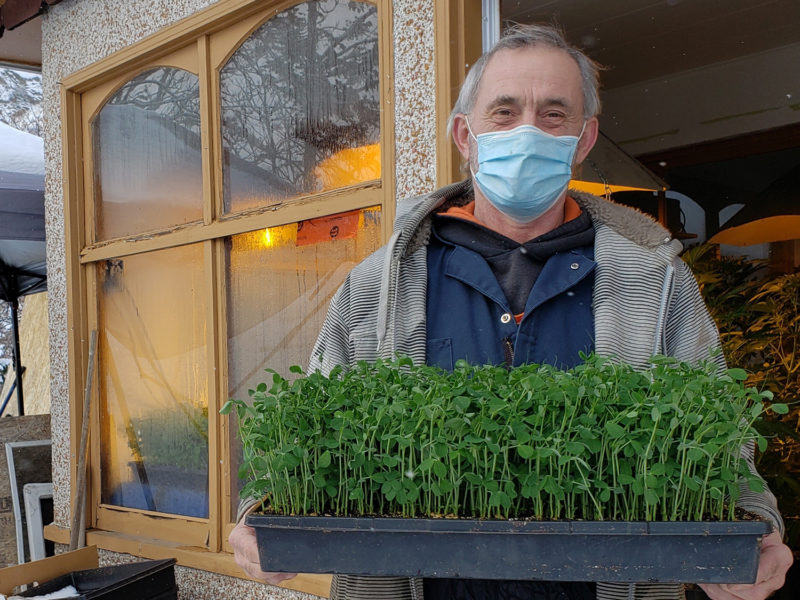LANGLEY – BC farmers institutes have a direct line to government under the province’s Farmers and Women’s Institute Act, originally enacted in 1938.
Knowing what’s in the act is important if today’s institutes want to have a greater impact, says Janet Thony, who addressed the second annual general meeting of the Langley Farmers Institute on January 25.
Thony, president of the Coombs Farmers Institute and past president of the District A Farmers Institute, highlighted the three most important clauses in the act.
“Clause number three tells us what we do as an FI. It’s not just about agriculture,” she says, noting there are five objectives listed. “The first four support agriculture; the fifth option is the wildcard.”
Under the fifth clause, an institute may be formed “to promote home economics, public health, child welfare, education and better schools.”
“It allows us then legally to work on items that maybe otherwise we would not think we can,” she says. “We’ve taken that to heart and recognized that it allows us to get involved on all kinds of levels.”
For example, the Cobble Hill Farmers Institute runs a seniors lunch program, hosts social events and holds youth-focused seasonal events in addition to owning a community hall, fair grounds and running a successful fall fair.
“If folks perceive you to be relevant, inclusive, you have a practical application, you’re keen problem-solvers and you maintain a fun, kind atmosphere, then they will be drawn to participate,” says Thony.
Ensuring involvement and interest for the Coombs group has come through social media, attending events and traditional items like business cards, brochures and banners.
“We took a booth at the fall fair eight years ago. So many people didn’t know what an FI was,” she says. “We signed up 10 members that weekend and we educated a huge number of people.”
A lack of rigid rules defining membership in the Coombs Farmers Institute is something she feels has also helped it succeed.
“Every member that we’ve got has a connection of their own individuality to agriculture,” she explains. “That’s why we vet them personally prior, but just in a general polite conversation. They probably don’t even know they are being vetted. Everyone is growing food on some level.”
This differs from the Langley Farmers Institute, which has a mix of voting members who have farm status and non-voting members who don’t. Thony says this is a model used by other institutes. She cautions against narrow definitions for membership.
“There’s farming elitism and it exists,” she says. “It’s incredibly dangerous and it does hurt us all. There’s nothing in the act that says who can belong and who can’t.”
She says institutes that narrowed their eligibility criteria too far died from attrition. There is room for members who may not have a farm,” she explains, “but need help, that need mentorship, need advice, need support and education.”
Farmers institutes use clause 26 to speak directly to the ministry. Individual institutes have a representative on a district institute, then each district has representation on the provincial advisory board.
“There is no other agricultural advocacy group that has that,” she says, noting that representatives are also exempt from registering with the province as lobbyists.
“That, in my opinion, is where the power in FIs comes from. They can’t tell us to just go away… that we’re just a special interest group.”
The third clause Thony mentioned was 21, which enables government to give institutes allowances.
“It’s unfortunately been ignored by government for decades. I’ve asked the question, when did the grants to institutes stop, and I haven’t received the answer,” she says.
While government funding would be helpful, Thony gave recommendations that will improve the chance of success for institutes like Langley, which are looking for ideas to excel.
Reducing volunteer burnout is important to Thony and she says eliminating monthly meetings makes a difference. Coombs has only two meetings a year: a March AGM and a November recap meeting.
“We have standing committees, we have an executive board,” she says. “We do a ton of communicating, of course, by email and phone.”
While burnout isn’t currently an issue for the Langley institute, COVID-19 and other events in 2020 led to transitions.
Megan Dykeman successfully ran as MLA for Langley East, resulting in her departure as president. She was succeeded by Barb Pearson of Early Bird Family Farm.
“We got ourselves back together and feel that we are working at a great pace here to try to bring representation to the Langley area,” says Pearson.
She and John Caldarella of Caldarella Family Tree Farm will be part of the Langley Township farm task force and the institute will also be included in the township’s agricultural advisory and economic enhancement committee.
“We are going to have a voice directly to the township,” Pearson says.
Thony notes that involvement in local politics is important.
“If we don’t take the time to engage in stakeholder engagement opportunities that the government offers us, we’re the ones that have dropped the ball,” she says.
Above all, she suggests institutes focus on being visible and, if events are hosted, they should be fun, offer a key benefit and attract a variety of people.
“Develop signature events that are of interest to a broad spectrum of people,” she
says.


 Strict pandemic plan keeps workers safe
Strict pandemic plan keeps workers safe